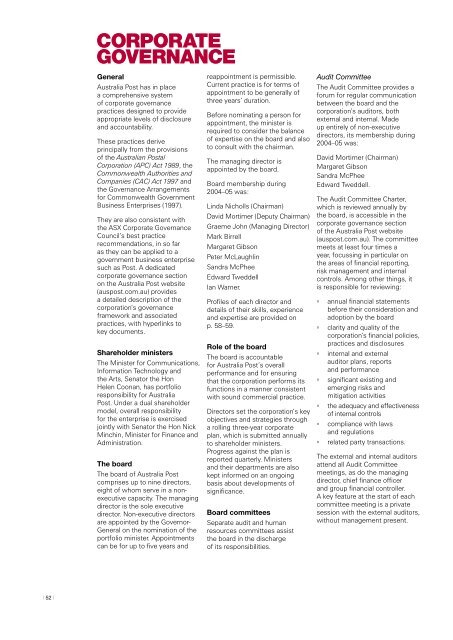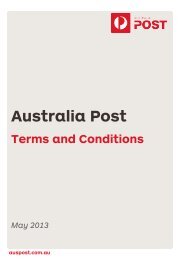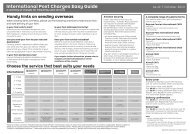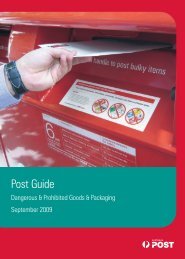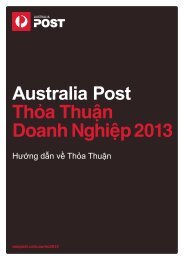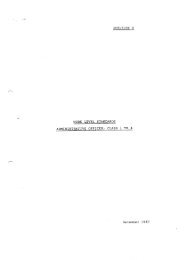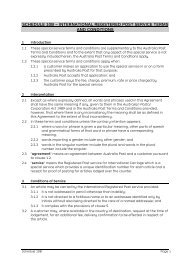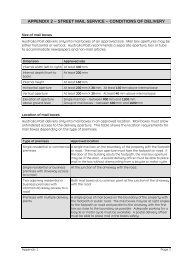2004-05 Annual Report - Australia Post
2004-05 Annual Report - Australia Post
2004-05 Annual Report - Australia Post
Create successful ePaper yourself
Turn your PDF publications into a flip-book with our unique Google optimized e-Paper software.
| 52 |<br />
CORPORATE<br />
GOVERNANCE<br />
General<br />
<strong>Australia</strong> <strong>Post</strong> has in place<br />
a comprehensive system<br />
of corporate governance<br />
practices designed to provide<br />
appropriate levels of disclosure<br />
and accountability.<br />
These practices derive<br />
principally from the provisions<br />
of the <strong>Australia</strong>n <strong>Post</strong>al<br />
Corporation (APC) Act 1989, the<br />
Commonwealth Authorities and<br />
Companies (CAC) Act 1997 and<br />
the Governance Arrangements<br />
for Commonwealth Government<br />
Business Enterprises (1997).<br />
They are also consistent with<br />
the ASX Corporate Governance<br />
Council’s best practice<br />
recommendations, in so far<br />
as they can be applied to a<br />
government business enterprise<br />
such as <strong>Post</strong>. A dedicated<br />
corporate governance section<br />
on the <strong>Australia</strong> <strong>Post</strong> website<br />
(auspost.com.au) provides<br />
a detailed description of the<br />
corporation’s governance<br />
framework and associated<br />
practices, with hyperlinks to<br />
key documents.<br />
Shareholder ministers<br />
The Minister for Communications,<br />
Information Technology and<br />
the Arts, Senator the Hon<br />
Helen Coonan, has portfolio<br />
responsibility for <strong>Australia</strong><br />
<strong>Post</strong>. Under a dual shareholder<br />
model, overall responsibility<br />
for the enterprise is exercised<br />
jointly with Senator the Hon Nick<br />
Minchin, Minister for Finance and<br />
Administration.<br />
The board<br />
The board of <strong>Australia</strong> <strong>Post</strong><br />
comprises up to nine directors,<br />
eight of whom serve in a nonexecutive<br />
capacity. The managing<br />
director is the sole executive<br />
director. Non-executive directors<br />
are appointed by the Governor-<br />
General on the nomination of the<br />
portfolio minister. Appointments<br />
can be for up to five years and<br />
reappointment is permissible.<br />
Current practice is for terms of<br />
appointment to be generally of<br />
three years’ duration.<br />
Before nominating a person for<br />
appointment, the minister is<br />
required to consider the balance<br />
of expertise on the board and also<br />
to consult with the chairman.<br />
The managing director is<br />
appointed by the board.<br />
Board membership during<br />
<strong>2004</strong>–<strong>05</strong> was:<br />
Linda Nicholls (Chairman)<br />
David Mortimer (Deputy Chairman)<br />
Graeme John (Managing Director)<br />
Mark Birrell<br />
Margaret Gibson<br />
Peter McLaughlin<br />
Sandra McPhee<br />
Edward Tweddell<br />
Ian Warner.<br />
Profiles of each director and<br />
details of their skills, experience<br />
and expertise are provided on<br />
p. 58–59.<br />
Role of the board<br />
The board is accountable<br />
for <strong>Australia</strong> <strong>Post</strong>’s overall<br />
performance and for ensuring<br />
that the corporation performs its<br />
functions in a manner consistent<br />
with sound commercial practice.<br />
Directors set the corporation’s key<br />
objectives and strategies through<br />
a rolling three-year corporate<br />
plan, which is submitted annually<br />
to shareholder ministers.<br />
Progress against the plan is<br />
reported quarterly. Ministers<br />
and their departments are also<br />
kept informed on an ongoing<br />
basis about developments of<br />
significance.<br />
Board committees<br />
Separate audit and human<br />
resources committees assist<br />
the board in the discharge<br />
of its responsibilities.<br />
Audit Committee<br />
The Audit Committee provides a<br />
forum for regular communication<br />
between the board and the<br />
corporation’s auditors, both<br />
external and internal. Made<br />
up entirely of non-executive<br />
directors, its membership during<br />
<strong>2004</strong>–<strong>05</strong> was:<br />
David Mortimer (Chairman)<br />
Margaret Gibson<br />
Sandra McPhee<br />
Edward Tweddell.<br />
The Audit Committee Charter,<br />
which is reviewed annually by<br />
the board, is accessible in the<br />
corporate governance section<br />
of the <strong>Australia</strong> <strong>Post</strong> website<br />
(auspost.com.au). The committee<br />
meets at least four times a<br />
year, focussing in particular on<br />
the areas of financial reporting,<br />
risk management and internal<br />
controls. Among other things, it<br />
is responsible for reviewing:<br />
° annual financial statements<br />
before their consideration and<br />
adoption by the board<br />
° clarity and quality of the<br />
corporation’s financial policies,<br />
practices and disclosures<br />
° internal and external<br />
auditor plans, reports<br />
and performance<br />
° significant existing and<br />
emerging risks and<br />
mitigation activities<br />
° the adequacy and effectiveness<br />
of internal controls<br />
° compliance with laws<br />
and regulations<br />
° related party transactions.<br />
The external and internal auditors<br />
attend all Audit Committee<br />
meetings, as do the managing<br />
director, chief finance officer<br />
and group financial controller.<br />
A key feature at the start of each<br />
committee meeting is a private<br />
session with the external auditors,<br />
without management present.


